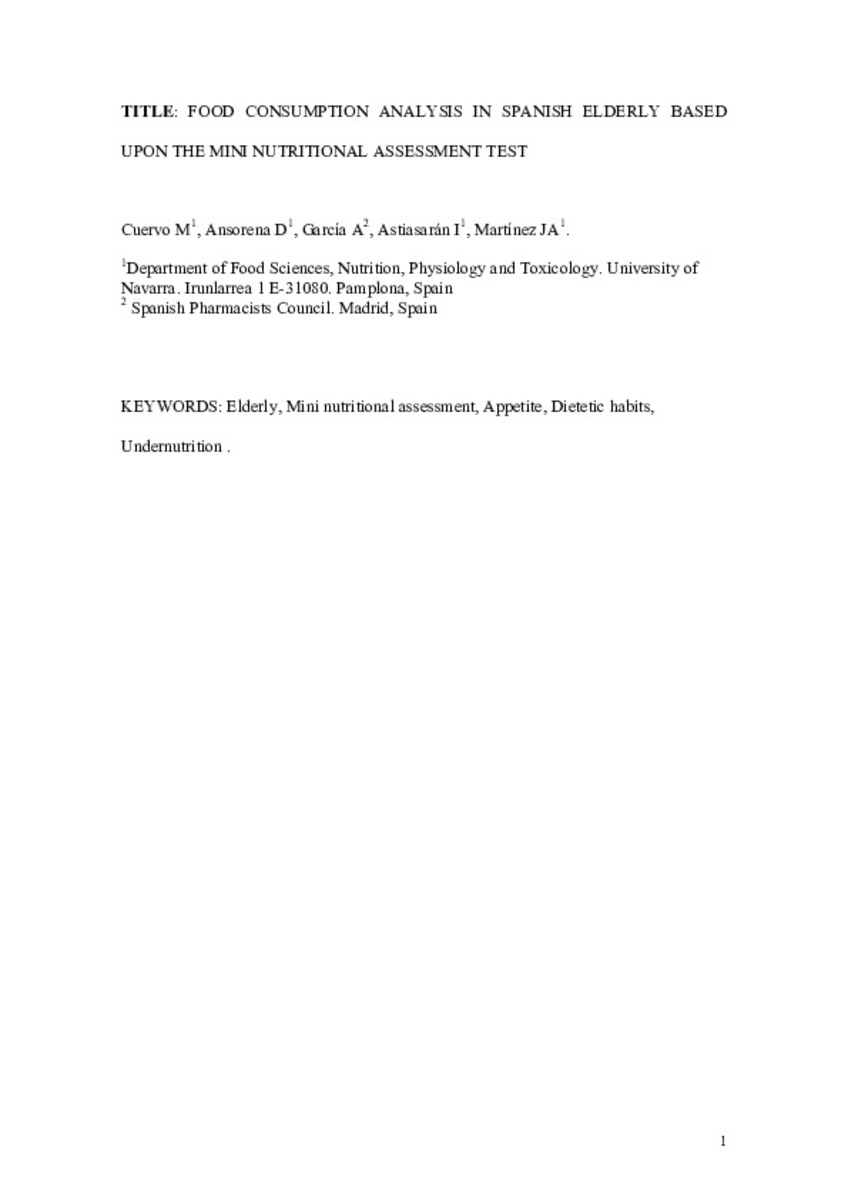Full metadata record
| DC Field | Value | Language |
|---|---|---|
| dc.creator | Cuervo, M. (Marta) | |
| dc.creator | Ansorena-Artieda, D. (Diana) | |
| dc.creator | García, A. (Aquilino) | |
| dc.creator | Astiasarán, I. (Iciar) | |
| dc.creator | Martinez, J.A. (José Alfredo) | |
| dc.date.accessioned | 2010-11-22T17:51:46Z | - |
| dc.date.available | 2010-11-22T17:51:46Z | - |
| dc.date.issued | 2008 | - |
| dc.identifier.citation | Cuervo M, Ansorena D, Garcia A, Astiasaran I, Martinez JA. Food consumption analysis in spanish elderly based upon the mini nutritional assessment test. Ann.Nutr.Metab. 2008;52(4):299-307. | es_ES |
| dc.identifier.issn | 0250-6807 | - |
| dc.identifier.uri | https://hdl.handle.net/10171/14271 | - |
| dc.description.abstract | Background/Aims: Aged people are an increasing population group worldwide, and nutritional impairments may contribute to additional health problems. The characterization of food consumption of elderly people is a good approach to implementing adequate nutritional policies in order to improve their nutritional status. The aim of this study was to describe and analyze specific aspects of food intake based upon the Mini Nutritional Assessment (MNA) test in a representative country sample. Methods: The survey consisted of a cross-sectional study assessing the nutritional status of 22,007 Spanish people aged 65 years or older using the MNA test. These data, including dietary information, were obtained by health professionals specifically trained to carry out the questionnaire. A multiple regression analysis was used to evaluate the contributing impact of the diet-related MNA questions on the total MNA score. Results: Differences in the food choices between men and women were found, but not in the mode of feeding. Obese and non-obese individuals, categorized by a body mass index (BMI) more or less than 30, showed similar intake patterns of protein-rich foods, but differences in fruits, vegetables and fluids. On the other hand, undernourished and non-undernourished subjects, according to the MNA criteria, revealed different food consumption. Loss of appetite and mode of feeding were the items with the highest influence the MNA total score. Conclusions: While age, gender and BMI considered together are responsible for 11.3% of the total MNA score, dietary-related items can predict the 62.4% of the total MNA classification in the overall elderly Spanish population. | es_ES |
| dc.language.iso | eng | es_ES |
| dc.publisher | Karger | es_ES |
| dc.rights | info:eu-repo/semantics/openAccess | es_ES |
| dc.subject | Elderly | es_ES |
| dc.subject | Dietetic habits | es_ES |
| dc.subject | Undernutrition | es_ES |
| dc.subject | Mini nutritional assessment | es_ES |
| dc.title | Food consumption analysis in Spanish elderly based upon the Mini Nutritional Assessment Test | es_ES |
| dc.type | info:eu-repo/semantics/article | es_ES |
| dc.relation.publisherversion | http://content.karger.com/produktedb/produkte.asp?typ=fulltext&file=000151483 | es_ES |
Files in This Item:
Statistics and impact
Items in Dadun are protected by copyright, with all rights reserved, unless otherwise indicated.






